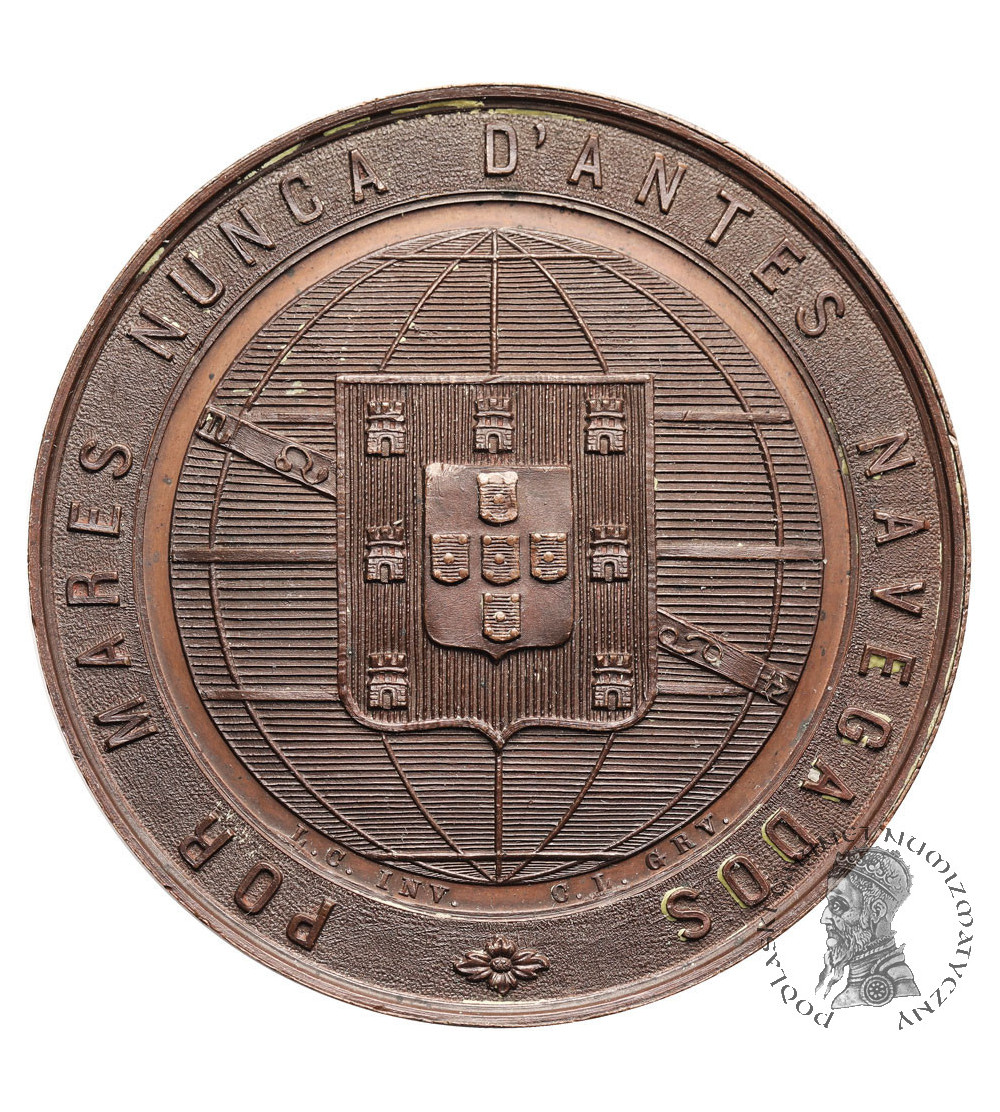




Portugal. Br medal 1885, Lisbon Geographic Society, dedicated to the explorers Capello and Ivens, Bronze 50 mm, weight 70,14 g., Condition XF+, nice brown patina with luster.
In 1875, Luciano Cordeiro founded the Lisbon Geography Society, bringing together an intellectual, civil and military elite. Although its action was not directed exclusively to the African continent, in the early years of its existence it created the Portuguese National Commission for the Exploration and Civilization of Africa, better known as the Commission of Africa which assumed the function of awakening public opinion to overseas issues and which prepared the first major expeditions of scientific-geographical exploration, funding by national subscription, thus contributing to the definition of a Portuguese colonial policy in Africa. These expeditions were intended to recognize the Cuango and its relations with Zaire, and also to compare the river's river basin with that of the Zambezi, thus concluding the southern central African charter, the famous Pink Map. Despite its fundamental role in defending the Portuguese position in Africa, in the face of the European expansionist movement, the Lisbon Geography Society emerged late, with regard to the creation of homologous societies in the other countries of Europe. These expeditions are part of a political context marked by a strong European expansionist surge in the areas of the African continent, which anticipate the historic Berlin Conference, held in 1885. Explorers of all major European powers launched into a real rivalry for prospecting territories, forcing Portugal to urgently review its colonial policy and to effect its presence in these places, but the Portuguese claims of occupation of space between Angola and Mozambique clashed with English pretensions, which materialized in the consequent claim of this zone to the English empire through the British Ultimatum to Portugal. Brito Capelo, when he was staying in Angola, made the scientific recognition of that area, which made him chosen, by Decree of May 11, 1877, to direct a scientific expedition to Central Africa, which also included the navy officer Roberto Ivens and army major Serpa Pinto. According to the decree, the territories between the provinces of Angola and Mozambique have been appointed 'to commake and direct the expedition that will be explored in the interests of science and civilization', and to study the relations between the Zaire and Zambezi river basins, in accordance with the instructions they receive authorized by my Government." Under the auspices of the Geography Society, this expedition was to "... the study of the Cuango River in its relations with Zaire and the Portuguese territories of the western coast, as well as the entire region that comprises to the south and southeast the origins of the Zambezi and Cunene rivers and extends to the north, until it enters the watersheds of Cuanza and Cuango.
On July 7, 1877 Brito Capelo, Roberto Ivens and Serpa Pinto began their expedition. After the Benguela-Bié route, divergences between Serpa Pinto and Brito Capelo lead the expedition to be divided, with Serpa Pinto, on his initiative trying to cross to Mozambique. In fact Luciano Cordeiro who had never conformed to the fact that the expedition was not from coast to coast came to find in Serpa Pinto a brother of the same dream, since Serpa Pinto dreamed of long time with a great company in Africa. From the beginning of the trip Serpa Pinto tries to divert the objectives of the expedition. Capelo and Ivens refuse what they consider to be "the ravings of Serpa Pinto" and cognose him as a counterfeiter and participate in the separation. Serpa Pinto eventually missed his goal, as he did not achieve it as he intended, to reach any point on the Mozambican coast, as was his stated intention. He arrived, however, in Pretoria, and later to Durban. Brito Capelo and Roberto Ivens remained faithful to the initial project, focusing their attention on the mission for which they had been appointed, that is, on the relations between the Zaire and Zambezi river basins. They later explain that they had "no right to ramble in the backcountry, wherever we wanted, driving our itinerary east or north." They traveled through the regions of Benguela to the lands of Iaca, having delimited the courses of the Cubango, Luando and Tohicapa rivers. On March 1, 1880, Lisbon triumphantly received Brito Capelo and Roberto Ivens, and the success of the expedition was perpetuated in the book De Benguela to the Lands of Iaca. source: wikipedia.org
The Lisbon Geographic Society (Portuguese: Sociedade de Geografia de Lisboa) is a Portuguese scientific society created in Lisbon in the year of 1875, aiming to "promote and assist the study and progress of geography and related sciences in Portugal." The Society was created in the context of the European movement of exploration and colonization, having its activity particular emphasis in the exploration of the African Continent. On 10 November 1875, a group of 74 subscribers petition King Luís I of Portugal the creation of a society, to be called Sociedade de Geografia de Lisboa, with the objective to "promote and assist the study and progress of geography and related sciences in the country." Two early subscribers were Luciano Cordeiro and Teófilo Braga, among many other intellectuals, journalists, and politicians of that time. The Society's goals were to organize conferences and scientific congresses, and grant funds destined to exploration trips and scientific investigation. In December 1876, the Society initiated the publication of the Boletim da Sociedade de Geografia de Lisboa (Lisbon's Geographic Society Bulletin), still in force today. source: wikipedia.org